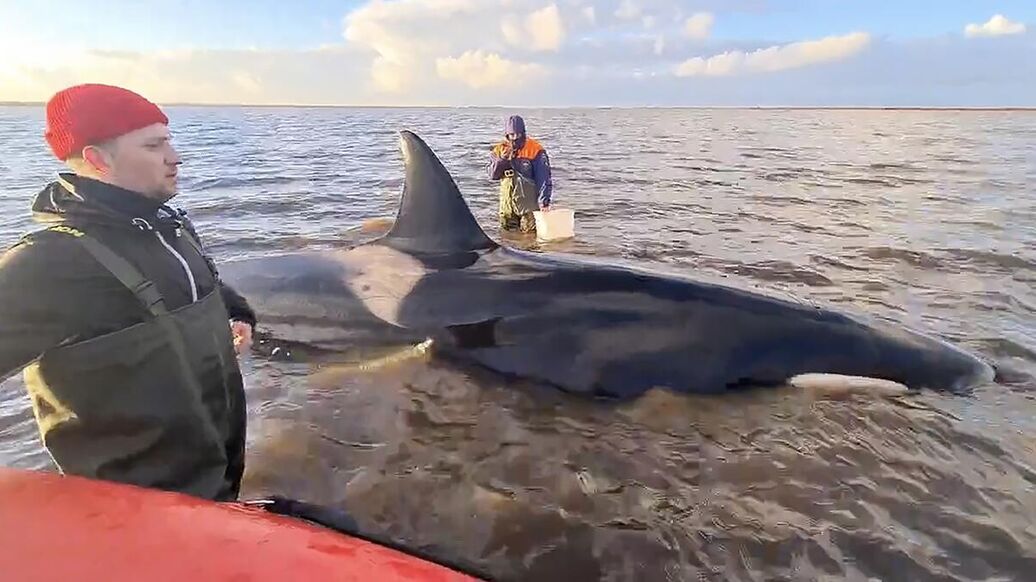Britain's nuclear test 'guinea pigs': Veterans reveal devastating health problems caused by watching bomb blasts up close and flying through fallout clouds without protection during Cold War
They were the tests that saw Britain establish itself as a nation capable of killing millions of people in the blink of an eye.
They were the tests that saw Britain establish itself as a nation capable of killing millions of people in the blink of an eye.
But the cost of the UKs post-war nuclear weapons programme led to what has been described as the longest-running scandal in the countrys history.
Now, more than six decades on, the veterans who were treated as guinea pigs in a race for military power have spoken out to shed more light on the devastating legacy of the tests in Australia and Christmas Island in the Pacific in the 1950s and 1960s.
You saw all the bones, tendons, everything through your hands, says 86-year-old former RAF cook Brian Unthank in tonights BBC documentary, Britains Nuclear Bomb Scandal: Our Story.
There was this humungous ball of fire boiling up into the sky. Hurtling towards you was this big line, this blast hits you, he adds.
From only several miles away, Mr Unthank saw the detonation of two hydrogen bombs with a combined yield of 320 Hiroshima bombs - he went on to lose all of his teeth and suffered gut problems and his wife had 13 late-term miscarriages.
I felt that my body was boiling, adds fellow ex-serviceman John Morris, also 86, as he recounted seeing a bomb blast. He and his wife went on to endure the trauma of their baby son dying in the night - a coroners report suggested his lungs had not formed properly.
They are just two of dozens of surviving veterans involved in the tests who have been left with devastating health problems after not being given protective gear or training.

The UKs first nuclear bomb (above) was successfully tested in the South Pacific on October 3, 1952

You saw all the bones, tendons, everything through your hands, says 86-year-old former RAF cook Brian Unthank in tonights BBC documentary, Britains Nuclear Bomb Scandal: Our Story
Britain remains the only country that has tested nuclear weapons but not accepted responsibility for the effects on victims.
The UKs first nuclear bomb was successfully tested in the South Pacific on October 3, 1952.
The bomb contained around 15lb plutonium, stored inside the hold of HMS Plym, a 1,450-ton Navy frigate off Trimouille Island, near Australia.
At 9:30am local time on October 3, 1952, the bomb was detonated. A 600mph blast wave rippled through the environment. A mauve cloud climbed 10,000ft above sea level.
Operation Hurricane was a success. Britain joined the United States and the Soviet Union as a nuclear power.
At the scene, servicemen aboard the guard ship HMS Zeebrugge could only cover their eyes and brace as the shockwave travelled through the air.
In the years that followed, around 39,000 British and Commonwealth servicemen and scientists saw the detonation of 45 atomic and hydrogen bombs, along with hundreds of radioactive experiments.
The tests transformed parts of what had been pristine land in the Australian Outback and beautiful coral atolls in the Pacific into some of the worlds most contaminated places.

Tonights programme shows footage of several of Britains nuclear tests

I felt that my body was boiling, adds fellow ex-serviceman John Morris, also 86, as he recounted seeing a bomb blast. He and his wife went on to endure the trauma of their baby son dying in the night - a coroners report suggested his lungs had not formed properly

Archie Hart, 87, was part of the crew of HMS Diana, the Ministry of Defences guinea pig ship. In 1956 it was sent through the fallout of two atomic bombs for eight hours at a time. Mr Hart has been left with around 150 lipomas - soft fatty lumps - on his body and in his 60s had to have a large portion of his bowel removed to treat aggressive cancer

John Folkes, 89, was ordered to fly through four mushroom clouds without protective clothing or being given warnings about the risks

Avon Hudson, 86, exposed the extent of contamination at test sites in Australia

Terry Quinlan, 84, experienced night terrors and now has severe heart problems. He was finally awarded a war pension last year, only after his surgeon found a lump of shrapnel in his chest
The new documentary reveals the testimony of five veterans in total. Also among them is John Folkes, 89.
He was ordered to fly through four mushroom clouds without protective clothing or being given warnings about the risks.
Although he was ground crew, Mr Folkes needed to be on the plane to operate a switch that would open flaps to allow scientists to take samples from the clouds.
Mr Folkes was also tasked with entering the smoking crater after an impact to take further samples.
He was left with post-traumatic stress disorder (PTSD) and permanent shaking hands.
The veteran says: We saw this inferno, crimson, black smoke billowing up towards us… The cloud was rising. It was coming up at an alarming rate.
I didnt think we were gonna make it. I felt so vulnerable. How we got so close and not vaporised I just dont know. This enormous shockwave flipped the aircraft over.
We were more or less upside down, but climbing, fortunately away from the bomb. The shock wave undoubtedly saved our lives.
Whether it was the intensity of that noise that shook or the electromagnetic pulse… my hands have shaken ever since.
Archie Hart, 87, was part of the crew of HMS Diana, the Ministry of Defences guinea pig ship.
In 1956 it was sent through the fallout of two atomic bombs for eight hours at a time.
The MoD wanted to see the effects of an atomic explosion on the ship and its 280 crew.

Members of the press and naval ratings aboard HMS Alert, 35 miles offshore of Malden Island, Kiribati. The passengers and crew were witnessing the second test of Britains hydrogen bomb, May 31, 1957

The crew of HMS Narvik watch the smoke rise after a British atomic test in 1956

A photography team sets up during the British nuclear test in the Montebello Islands, October 1952

Setting up the equipment of the photography team during Operation Hurricane, Britains first nuclear weapon test

The explosion sent a 600mph blast rippling as smoke plumed in the sky

A mushroom cloud after the test on Christmas Island on May 15, 1957
They would have us believe that this nuclear fallout was just a gentle rain from heaven... It wasnt. It was toxic and it was deadly. It was ionising radiation, he says.
Everybody on that ship were used. You werent given a choice in this. And if thats not being used, tell me what is.
Mr Hart has been left with around 150 lipomas - soft fatty lumps - on his body and in his 60s had to have a large portion of his bowel removed to treat aggressive cancer.
Calls have been made for the Government to release the information collected at the time, but many still say they have been repeatedly denied access to their medical records.
The Ministry of Defence has repeatedly denied that the Atomic Weapons Establishment holds any evidence that blood samples were taken at nuclear tests.
In 2022, the Mirror revealed a cache of 150 documents discussing blood tests that had been withheld.
America, China, France and Russia have accepted responsibility for the damage the tests may have caused veterans attending the experiments.
In 2021, Keir Starmer, then leader of the opposition, said: The country owes a huge debt of honour to these veterans…Labour will continue to support their campaign every step of the way.
John Healey, now Defence Secretary, added a year later: There is no good reason, no good moral reason, no good military reason, for withholding the recognition and compensation that other countries have had.
Your campaign is our campaign. We go into the next election with a pledge to right this injustice.
A spokesperson for the Ministry of Defence told MailOnline in September: We recognise the huge contribution that Nuclear Test Veterans have made to national security.
This new government is committed to working with veterans and listening to their concerns.
We have already pledged to reconsider the criteria for the commemorative Nuclear Test Medal – a key component of our recognition of their service.
Ministers are looking hard at the issue - including the question of records.
They will continue to engage with the individuals and families affected, and part of this engagement, the Minister of Veterans and People, Alistair Carns has already met with parliamentarians and a Nuclear Test Veteran campaign group to discuss their concerns further.
Britains Nuclear Bomb Scandal: Our Story airs tonight at 9pm on BBC Two.










